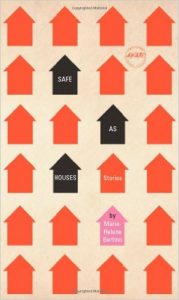From Reading to Wonder:
Erika Anderson on Safe as Houses by Marie-Helene Bertino
~6th in a series
When I tell people I’m a writer, they ask what I’m reading. This is smart. It’s smart because more often than not, we’re in a bar, and I’m not sure if I want to talk about my writing at top volume while “Somebody That I Used to Know” wails in the background. Every time I try to explain what I write and for whom in short bark-like shouts, I find myself on an existential quest. This is not how I want to spend my Friday nights.
What I’m reading is Marie-Helene Bertino’s Safe as Houses, her debut collection and the winner of the Iowa Short Fiction Award. I’m into atheist, hard-drinking, chain-smoking Ruby, the protagonist of “Carry Me Home, Sisters of Saint Joseph.” The sisters want Ruby, the new groundskeeper, to talk to the tomato plants and make them grow:
Sister Charlene leads [the Sunday school class] out of the courtyard and Sister Helena has business in the kitchen, so I am left alone with the tomatoes. I feel nervous, like a newcomer at a party, trying to smalltalk with a person I’ve just met. I say, “How you bitches doin’?”
Everyone always laughs. They don’t giggle or smile. Short of throwing their heads back, or actually rolling around on the floor, their faces are soft and happy and everything is right.
I’ve seen Bertino read twice now, once at WORD in Brooklyn’s Greenpoint, where Bertino stood in front of the podium, saying, “I promise there will be no audience participation.” She read from “Sometimes You Break Their Hearts, Sometimes They Break Yours,” narrated by an alien who faxes her observations about human beings to her home planet.
Human beings, I fax, fetishize no organ more than the heart. When they like someone they say, There’s a girl after my own heart. They will stand or sit very close to the person they love with their heart. When they are sad they say, My heart is broken. They will tell large groups of people things they don’t believe. But the heart is just a muscle with an important job. Just an area in the body.
What is it about the heart? Did Hallmark put us up to this? Could we just as easily be talking about the liver? Does grief cause us to delude ourselves, to say I’ll never find someone else like him? It does. Yet in the moment that delusion feels true, it feels necessary.
Both the alien and Ruby introduce themselves and their stories with what I like to think of as a statement of purpose. Prior to moving in with the Sisters of Saint Joseph, Ruby proclaims:
I am quitting a boy like people quit smoking. I am not quitting smoking. The pamphlet insists: Each time you crave a cigarette, eat an apple or start a hobby! Each time I think about Clive, I smoke a cigarette. If I have already smoked a cigarette, I eat an apple. If I have already eaten an apple, I start a hobby. I smoke two packs a day. I pogo-stick, butterfly-collect, macramé, decoupage. I eat nothing but apples. I sit in my kitchen, a hundred of them arranged on the table. If I can eat this pyramid of apples, I will be over Clive.
Ruby’s plan leads me to wonder what simple equations I have relied on. If I like you, then you will like me back. If you like me back, then you will call me. If you call me, then we will go out. If we go out, then we will fall in love. Always in, never out.
Ruby’s plan also leads me to wonder what I have reached for in desperation. The wrong boy at the right time, his eyes saying everything he would not? The last piece of pink frosted sheet cake, the sides drying and crusty after sitting out all afternoon? Shots of I-don’t-even-know-what with bartenders at the end of the night?
Toward the end of “Carry Me Home, Sisters of Saint Joseph,” Ruby contemplates the children in the Sunday school:
These kids will grow up. Some of the boys will never feel tall enough. Some of the girls will look great in pictures but in real life will be dull and forgettable, the girls on the bench at the mall you ask to move so you can throw out your soda. Some of them will never be able to find their keys. Some will triumph. One day a person they love will say I do not love you. One day every one of them will die. Today is not that day.
For the first time I wonder if this place that hurts might not be the heart but something else altogether, or perhaps nothing at all. I wonder if there’s no special meaning to the one who has left us, or to the one we have left. I wonder when I’ll know what kind of writer I am, or if it doesn’t matter anymore. I wonder when I might describe my writing in staccato bursts over the latest break-up anthem without feeling the need to prove anything.
~
Safe as Houses
Mary-Helene Bertino
University of Iowa Press
2012
.
.
.Running sports | Entrainement Nike

